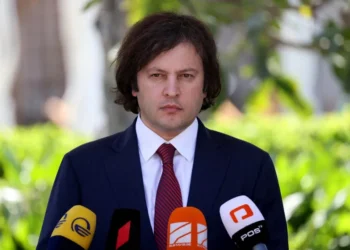The war in Ukraine has been dominating conversations at the World Economic Forum in Davos this week, with Ukraine’s President Volodymyr Zelensky making the most of the opportunity to address the global business and political elite.
Zelensky told delegates that his Russian counterpart, Vladimir Putin, will “steal” years of peace and threatened the wider world if he is allowed to succeed in his invasion of Ukraine.
US Secretary of State Antony Blinken met Zelensky at Davos on Tuesday and said there would be a “real problem” if Congress did not approve additional (and contentious) funding for Ukraine.
In other news, Putin said Tuesday it was “impossible” to take away from Russia the military gains it had made in Ukraine.
Other key updates include:
Protesters in Baymak, a small town in Russia’s central Bashkortostan region, clashed with riot police on Wednesday after a court sentenced eco-activist and campaigner for the protection of the Bashkir language, Fail Alsynov, to four years in prison for “inciting hatred”. Police used teargas to disperse the protests, according to OVD-Info, which monitors protests across Russia. The head of the local interior ministry, Rafail Divayev, urged demonstrators to back down and said: “I advise you to come to your senses and not ruin your life.”
Ukraine’s foreign minister, Dmytro Kuleba, said his country’s priority for 2024 was to gain control over its skies. “In 2024, of course the priority is to throw Russia from the skies,” Kuleba said in an address to the World Economic Forum.
A new military doctrine that for the first time provides for the use of nuclear weapons will be put forward by Belarus, its defense minister, Viktor Khrenin, said at a meeting of Belarus’ security council on Tuesday.
A top NATO military officer said the war in Ukraine could “determine the fate of the world” and western armies and political leaders must drastically change the way they help Kyiv fend off invading Russian forces. The chair of the NATO military committee, Adam Rob Bauer, also said, at a meeting of NATO’s senior officers at its headquarters in Brussels, that behind Putin’s rationale for the war is a fear of democracy.
US Secretary of State Antony Blinken said he doesn’t think a ceasefire in Ukraine is near, but he could see a future where Ukraine stands strongly on its own two feet. Blinken was in conversation with WEF founder Klaus Schwab and commentator Thomas Friedman in Davos.
One person has been killed and five people injured after Russian attacks on multiple settlements in Kherson oblast, regional authorities say. Its governor, Oleksandr Prokudin, shared a video of the damage to the area and said that Russian forces fired at the area for an hour. He added that three people were injured in Russian attacks against Beryslav and an 81-year-old woman was injured in an attack on the village of Romashkove.
British foreign secretary, David Cameron, told delegates at the World Economic Forum in Davos that there is a clear case for frozen Russian assets to be used to help pay for the reconstruction of Ukraine.
Russia is developing its relations with North Korea in all areas, including “sensitive” ones, Kremlin spokesperson Dmitry Peskov said on Wednesday. North Korea’s foreign minister held rare talks in the Kremlin with Putin, who has been invited by North Korean leader Kim Jong-un to visit the reclusive nuclear-armed country.
EU chief Ursula von der Leyen said she was “confident” of getting Hungary to drop its veto on a €50bn ($54bn) aid package for Ukraine at a crunch summit in two weeks. Hungary’s right wing prime minister, Viktor Orbán – Russia’s closest EU ally – refused in December to sign off on the assistance to Kyiv’s state spending over the next four years.
Russia will open polling stations for its March presidential election at three diplomatic missions in the US, its envoy in Washington said on Wednesday. Moscow said it had not yet decided if voting would take place in what it calls “unfriendly” European countries.
Ukraine downed 19 of 20 Iranian-designed attack drones launched by Russia at targets in southern Ukraine overnight Wednesday, said Ukraine’s air force.
At least 17 people were injured after Russia fired two missiles at Kharkiv in north eastern Ukraine during the night, hitting apartment buildings and a medical center, said officials on Wednesday. Three people were injured in the southern city of Odesa in a drone attack that forced the evacuation of about 130 people from an apartment building, regional governor Oleh Kiper said.
The Russian defense ministry said Wednesday that two winged Ukrainian drones and four missiles were shot down over the Belgorod region overnight and another around noon local time on Wednesday. It provided no details about damage or injuries.
Authorities in Estonia have arrested Russian professor Viacheslav Morozov on espionage charges in a case that his university said shows Russia’s intent to “orchestrate anti-democratic action” in the Baltic country.
Germany delivered military supplies to Ukraine, including ammunition for Leopard 1 tanks, armored personnel carriers, missiles, drones and helmets. It also includes 16 Zetros tanker trucks, eight armored personnel carriers, 50 mobile satellite terminals, 25 Heidrun reconnaissance drones and 1,840 helmets.
Russian Foreign Minister Sergey Lavrov will travel to New York next week for a meeting of the UN’s security council, confirmed foreign ministry spokesperson Maria Zakharova.
Western companies supplied Russia with critical components worth $2.9bn in the first 10 months of 2023, despite sanctions on Moscow, the Ukrainian president’s office said on Wednesday.
Belgium does not oppose the confiscation of €280bn worth of frozen Russian central bank assets, but there needs to be a clear mechanism such as using the assets as collateral for Ukraine, Prime Minister Alexander De Croo said.
Ukraine needs financial support as well as military support in order to prevent the government in Kyiv from resorting to printing money to keep the economy afloat, the chief economist of the European Bank for Reconstruction and Development, Beata Javorcik, said in an interview at Davos.
Compiled by Ana Dumbadze














